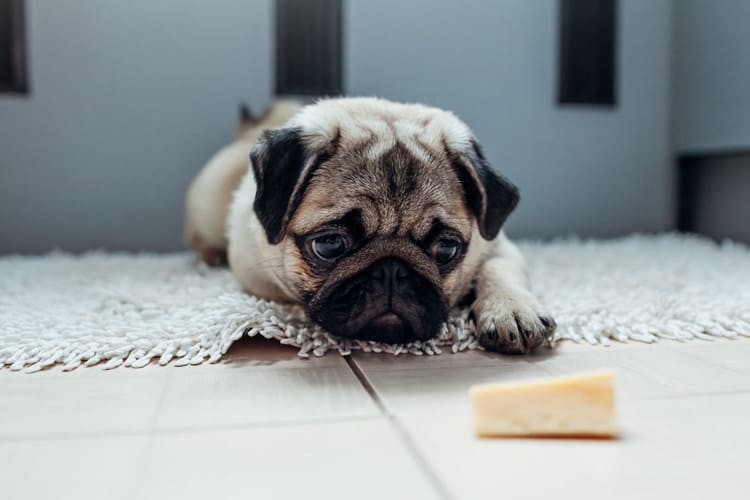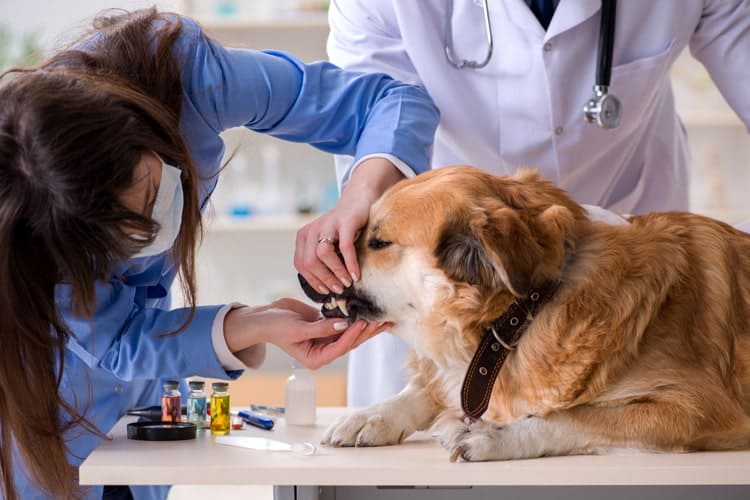One thing is for sure, it’s not always easy to figure a puppy out. After all, we can’t tell our parents what’s going on. There are plenty of things we do that people just don’t understand. One of the biggest concerns is when we stop eating.
Whether we’re just a young pup or we’re all grown up, it’s a pretty common issue. It could be as simple as us just not having an appetite that day, or it could be a sign of bigger issues. Whatever the case, it’s understandable that it can be quite alarming for our owners considering that we have no way of telling them how we’re feeling.
The question then becomes not why we’re not eating, but how long a puppy can go without eating? There’s no easy answer to those questions, but we can look at why your puppy may not be eating and how to help prevent health issues.
How Long Can a Puppy Go Without Eating?
Just like people, dogs are individuals, and each one is different in its own way. Because of this, it can be hard to generalize just how long they can go without eating. Drinking is just as important as eating, if not more so. If your puppy’s refusal to eat is coupled with a lack of drinking, they must see a vet right away as it can quickly spiral into something very serious.
With that said, an otherwise healthy puppy can go some time without eating, as many as 5 days or more, provided they are still drinking. Of course, that doesn’t mean you should let it go that far, and there are some things that you can do to help your pup regain its appetite that we’ll look at further.
Very young puppies, on the other hand, need considerable nutrition to support their growth. Going without puppy food for any length of time could be detrimental to their overall health and wellbeing. If your young pup has gone more than a couple of days without eating, they should see a vet as soon as possible.
Why Your Puppy May Not Want to Eat

There could be countless reasons why your puppy won’t eat, and if we were to cover each one, we’d be here for days. There are, however, some reasons that are more common than others. Those are the ones we’ll take a look at.
1. Your Puppy Simply Doesn’t Feel Like Eating
Not wanting to is the most common reason that your puppy isn’t eating. It happens to all of us, young and old. There are times when we just don’t feel like eating. There’s nothing wrong with us; we just don’t have an appetite. There’s no doubt that it can be alarming to see us not eat, but it happens. The good thing is that it’s something that will resolve itself quite quickly, usually within a meal or two we will be back to normal.
2. Food Changes
When we are young, it’s common for a dog owner to change up what they’re feeding us from time to time, trying to find which is best for us. While tweaking our meals to suit our needs is a good thing, it may be something that turns us off for a while. This aversion is perfectly normal and is something that again will usually resolve itself quickly. We may not be up for a change from our old food right away, but we’ll get used to it, even a dog that is a picky eater. To avoid us not eating altogether, introduce new food slowly by mixing it with our usual food.
3. Bad Food
Just because our dry food has a long shelf life doesn’t mean that it won’t spoil. The good thing is that we’re quite in tune with our food since we eat it day in and day out. If it has gone bad, we will be quick to let you know by refusing to eat it. The easiest way for our parents to tell if our food is spoiled is by checking for foul odors or any signs of mold or discoloration. If you think it may have gone bad, stop feeding it to us and give us some fresh stuff. You’ll know that was the issue if we dive right into a bowl of fresh food.
4. Teething
Teething is another common reason why a young pup might stop eating. It makes perfect sense, too, as teething can be painful, and who wants to be chewing on hard kibble when their teeth hurt. Like the other issues above, a lack of eating because of teething is something that will resolve itself quickly. Remember, like puppies, we love to eat and are usually willing to put up with a bit of pain to fill our bellies.
5. Medical Issues

Countless different medical issues could cause both puppies and older dogs to stop eating. While some medical issues, like a simple upset stomach, will take care of themselves, there’s a good chance that a lot of these issues will need some medical attention. Medical problems that will cause us to stop eating can include, but are not limited to the following:
- Upset Stomach
- General pain
- Intestinal obstructions
- Worms
- Infections
- Allergies
- Cancer
- Organ failure
This list can be more than a little concerning, but our owners mustn’t panic. Stay calm and seek the advice of a medical professional.
6. Stress, Anxiety, and Depression
Young or old, dogs are just as susceptible to mental health problems as our humans can be, but our parents often overlooked it because we have funny ways of showing it, like biting our nails or refusing to eat.
Thankfully, stress, anxiety, and depression are often easily treated in puppies, and usually without any medical intervention. If your puppy seems stressed, remove the stressors that might be triggering their loss of your dog’s appetite. It might not be easy to pinpoint, but paying close attention to your puppy’s environment and how they interact and react to things around them can help them to overcome some, if not all of their mental issues.
7. Medications
As with medications that our owners take, ours can have side effects that could cause us to stop eating, most notably nausea. It’s very common for medications to upset your stomach, and this can include our routine vaccinations. If your puppy comes home from getting their shots and he or she doesn’t want to eat, don’t panic, it’s normal. If they continue to refuse their meals, call the vet and let them know what’s happening. It may not be a major problem, but information like that can help the vet adjust the medication and hopefully avoid the loss of appetite the next time. For the most part, if any medication upsets your stomach enough that we don’t want to eat, it will usually resolve itself after a missed meal or two.
8. Social Mealtimes
This one is for those who have more than one dog. Some dogs, especially when they are young puppies, can get intimidated when other dogs are. around at mealtime. It’s not always to the extreme that dogs are fighting over food either, but instead can be something as simple as your puppy not liking the presence of another dog while they are eating. If it becomes too overwhelming for them, they will simply refuse to eat. If you suspect that this may be the issue, you might have to separate your animals at mealtime, having them eat in different areas.
What to do if Your Puppy is Refusing to Eat

Nobody knows your puppy as you do, and because of that, you are the best judge of their character. Your instincts are strong, and it will probably be easy for you to tell when something is wrong. While you should always trust those instincts, here are a few things to keep in mind when your puppy refuses to eat.
1. Don’t Panic
Just because refusal to eat can indicate that something is going on with your pup, it doesn’t mean that it is time to panic. Puppies can refuse to eat for many different reasons, many of those only lasting short periods and not having any dire effects. If your puppy is still acting normally and not showing any strange symptoms, then there’s a good chance that they, simply may not feel like eating and will continue doing so on their schedule. If the fast continues for more than a day or two, reach out to your vet to get advice on what to do next.
2. Pay Attention to When They Stopped Eating
Your dog may be able to go a few days without eating, but that doesn’t mean that they should. It’s important to know when they stopped eating so that the fasting doesn’t continue for too long and lead to other health issues. As mentioned above, 48 hours is a good timeline if your puppy isn’t exhibiting any other symptoms with their lack of eating. Knowing when they began to refuse their food is important in determining when to take the next step, and it will more than likely be the first question the vet asks you when you do end up contacting them.
3. Be Aware of Other Symptoms
More serious medical conditions will have other symptoms aside from your puppy not eating, but those aren’t always obvious, so it’s important to pay close attention to your dog’s behavior. If their lack of appetite is paired with vomiting or diarrhea, get a hold of the vet and have them do a physical to help determine what might be happening.
You can check for other things at home, too, such as a distended belly or tooth and gum pain. Your puppy’s stomach shouldn’t be hard, and there shouldn’t be any pain if you press on it. If there is, it’s a strong indication that they have a more serious stomach condition. The same goes for their gums. Healthy gums should be moist and pink, and if your puppy flinches in pain when you touch their gums or teeth, it could be an indication of an infection.
4. Tempt Your Puppy
There’s a pretty good chance that your puppy isn’t eating for no other reason than they are being picky. The easiest way to determine whether this is the case or not is by tempting them into eating their favorite treats, or maybe other food like a piece of cheese. If they readily gobble this stuff up, then they’re probably just being picky and will resume eating their regular food on their schedule.